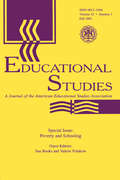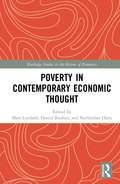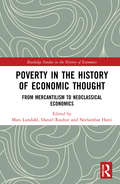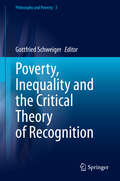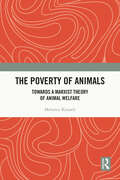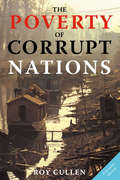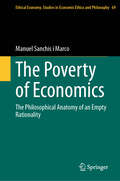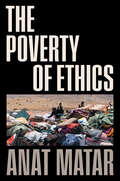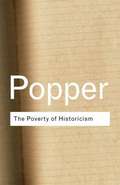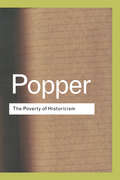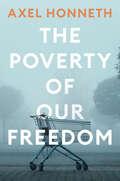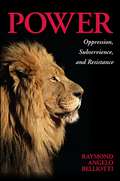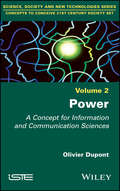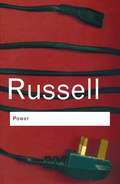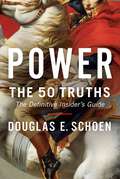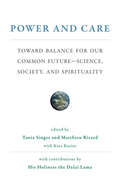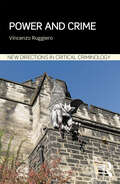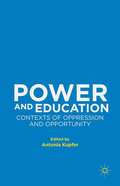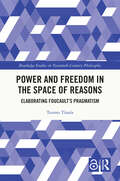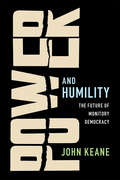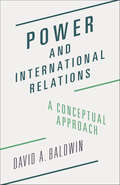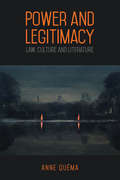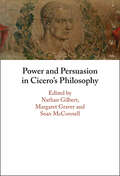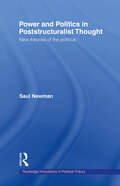- Table View
- List View
Poverty and Schooling: A Special Issue of Educational Studies
by Sue Books Valerie PolakowFirst published in 2001. Routledge is an imprint of Taylor & Francis, an informa company.
Poverty in Contemporary Economic Thought (Routledge Studies in the History of Economics)
by Mats Lundahl Daniel Rauhut Neelambar HattiPoverty in Contemporary Economic Thought aims to describe and critically examine how economic thought deals with poverty, including its causes, consequences, reduction and abolition. This edited volume traces the ideas of key writers and schools of modern economic thought across a significant period, ranging from Friedrich Hayek and Keynes to latter-day economists like Amartya Sen and Angus Deaton. The chapters relate poverty to income distribution, asserting the point that poverty is not always conceived of in absolute terms but that relative and social deprivation matters also. Furthermore, the contributors deal with both individual poverty and the poverty of nations in the context of the international economy. In providing such a thorough exploration, this book shows that the approach to poverty differs from economist to economist depending on their particular interests and the main issues related to poverty in each epoch, as well as the influence of the intellectual climate that prevailed at the time when the contribution was made. This key text is valuable reading for advanced students and researchers of the history of economic thought, economic development and the economics of poverty.
Poverty in the History of Economic Thought: From Mercantilism to Neoclassical Economics (Routledge Studies in the History of Economics)
by Mats Lundahl Daniel Rauhut Neelambar HattiPoverty in the History of Economic Thought: From Mercantilism to Neoclassical Economics aims to describe and critically examine how economic thought deals with poverty and the poor, including its causes, consequences, reduction, and abolition. This edited volume traces the economic ideas of key writers and schools of thought across a significant period, ranging from Adam Smith and Malthus through to Wicksell, Cassel, and Heckscher. The chapters relate poverty to income distribution, asserting that poverty is not always conceived of in absolute terms, and that relative and social deprivation matter also. Furthermore, the contributors deal with both individual poverty and the poverty of nations in the context of international economy. By providing such a thorough exploration, this book shows that the approach to poverty differs from economist to economist, depending on their particular interests and the main issues related to poverty in each epoch, as well as the influence of the intellectual climate that prevailed at the time when the contribution was made. This key text is valuable reading for advanced students and researchers of the history of economic thought, economic development, and the economics of poverty.
Poverty, Inequality and the Critical Theory of Recognition (Philosophy and Poverty #3)
by Gottfried SchweigerThis book brings together philosophical approaches to explore the relation of recognition and poverty. This volume examines how critical theories of recognition can be utilized to enhance our understanding, evaluation and critique of poverty and social inequalities. Furthermore, chapters in this book explore anti-poverty policies, development aid and duties towards the (global) poor. This book includes critical examinations of reflections on poverty and related issues in the work of past and present philosophers of recognition. This book hopes to contribute to the ongoing and expanding debate on recognition in ethics, political and social philosophy by focusing on poverty, which is one highly important social and global challenge.“If one believed that the theme of “recognition” had been theoretically exhausted over the last couple of years, this book sets the record straight. The central point of all the studies collected here is that poverty is best understood in its social causes, psychic consequences and moral injustice when studied within the framework of recognition theory. Regardless of how recognition is defined in detail, poverty is best captured as the absence of all material and cultural conditions for being recognized as a human being. Whoever is interested in the many facets of poverty is well advised to consult this path-breaking book.” Axel Honneth, Columbia University.
The Poverty of Animals: Towards a Marxist Theory of Animal Welfare
by Mehmet KanatliThis book makes a theoretical contribution to animal rights issues from a Marxist perspective. Drawing on ethics, politics, and philosophy, it focuses on how to create a social formation that will improve animal welfare. Further, the book enables the readers to grasp current theoretical debates on animal welfare and to gain insight into theoretical and practical perspectives in dealing with the animal issues. The volume will be of great interest to scholars of politics and political philosophy, especially Marxism, and animal rights activists.
The Poverty of Corrupt Nations
by Roy CullenThe fight to eliminate world poverty is being severely hampered by corrupt leaders in developing countries. According to the African Union, some $150 billion is lost every year to corruption in Africa. In China, it is estimated corruption diminishes the annual value of gross domestic product by 15%. The pattern repeats itself elsewhere. This bleak situation compounds the poverty problem even more because donor countries are justifiably reluctant to support jurisdictions whose leaders are known to be corrupt, ignoring their citizens’ needs while stealing and laundering public funds for private use. What development does occur in chronically corrupt nations is often poorly planned and environmentally unsustainable, since the private gain of corrupt politicians and officials takes precedence over the implementation of sound development strategies. Likewise, bureaucratic corruption also results in the compromising of worker and consumer safety after all, a bribe costs less than obeying the law. And it is the poor who really pay the true cost of corruption. The Poverty of Corrupt Nations is a straightforward, easy-to-read exposition of the nature and scope of global corruption and money laundering, explaining the impact of recent troubling corruption trends on the public-at-large and public policy makers. Specifically, Cullen examines the links between world poverty, corruption, terrorism, global migration patterns, and money laundering. Constructively, Cullen then outlines a practical 20-point program to increase transparency and accountability in governments and parliaments around the world and break this cycle of corruption and poverty.
The Poverty of Economics: The Philosophical Anatomy of an Empty Rationality (Ethical Economy #69)
by Manuel Sanchis i MarcoThis book improves the alignment of economics with the idea of justice, the first virtue of any social institution, according to Rawls. To this aim, it provides the analytical framework necessary to ensure a just economy. While today’s notion of economics favours the economics of extortion, this book proposes a model that transcends Lionel Robbins’ canonical relationship between ends and means, as it proposes a broader notion of rationality incorporating the range of human attributes. In contrast to Robbins' economic rationality, economic choices must be based on adequate and good reasons, as Rescher claims, because both the means and the ends require rational deliberation. As a result, the book challenges Robbins’ hope of turning general concepts like scarcity, costs, etc. into universal economic principles guiding human behavior in a vacuum. It disputes the idea that, through the application of the abstract formulation of economic statements unconnected to reality, economics can be rationalized in a morally neutral space, based on empty rationality. By contrasting the three rival versions of economics —formalism (axiomatic), empiricism (technocratic-consequential), and institutionalism (axio-ideological)— the book shows that it is not possible to switch between them as they refer to segmented mental universes of abstraction.
The Poverty of Ethics
by Anat MatarWhy the left should reclaim ethics and morality for itselfThe Poverty of Ethics stands the usual moral-political dichotomy on its head. It argues that moral principles do not in fact underlie or inform political decisions. It is, rather, the conceptual primacy of political discourse that rescues ethics from its poverty. Our ethical convictions receive their substance from historical narratives, political analyses, empirical facts, literary-educational models, political activity and personal experience. Yet morality, essentially, doesn&’t leave room for relativity: not every ethos deserves to be titles &‘moral&’. Hence the book argues further, it is the left ethos, as it has evolved over years, which forms the basis for ethics: morality is left-wing! Clarifying and justifying this seemingly odd statement is the main purpose of this essay. Appealing to philosophical ideas on the essence of language, on meaning, on understanding and persuasion, this book scrutinizes the system of concepts and attitudes informing our common view of the relationship between the moral and the political. It argues that the traditional conception of morality is far too narrow to form a basis for political thought and political action. Its carefully unfolded argument concludes that none of the current philosophical accounts of morality can be translated into terms of political will, much less into direct political action. Being too general and elastic, neither abstract moral principles, ethical-aesthetic sensibilities, nor the ethical demand emanating from an Other, can fulfill these tasks. Instead, the false primacy of the ethical over the political and the infinite flexibility of vacuous moral discourse are often mobilized to launder wrongs and delegitimize radical left politics. Gratification of the moral high ground becomes an implement of de-politicization, and thus a powerful political instrument in the hands of those seeking to shore up the existing order.
The Poverty Of Historicism
by Karl PopperKarl Popper's The Poverty of Historicism is a devastating criticism of the idea that there are fixed laws in history and that human beings are able to predict them. Popper dedicated the book to all those who fell victim to the fascist and communist belief in Inexorable Laws of Historical Destiny. It has inspired generations of intellectuals, policy makers and general readers alike. On its publication in 1957, it was hailed by Arthur Koestler as probably the only book published this year which will outlive the century.
The Poverty of Historicism (Routledge Classics)
by Karl PopperOn its publication in 1957, The Poverty of Historicism was hailed by Arthur Koestler as 'probably the only book published this year which will outlive the century.'A devastating criticism of fixed and predictable laws in history, Popper dedicated the book to all those 'who fell victim to the fascist and communist belief in Inexorable Laws of Historical Destiny.' Short and beautifully written, it has inspired generations of readers, intellectuals and policy makers. One of the most important books on the social sciences since the Second World War, it is a searing insight into the ideas of this great thinker.
The Poverty of Our Freedom: Essays 2012 - 2019
by Axel HonnethThere is no normative concept more appealing today than the idea of individual freedom. Political party manifestos are drawn up, legal reforms are defended, military interventions are undertaken, even decisions in personal relationships are justified – all in the name of individual freedom. But our understanding of freedom is impoverished if we try to grasp its essence merely in terms of the subjective rights of the individual.In his new book, Axel Honneth shows that we still have a lot to learn from the tradition of philosophy about a rational concept of freedom. Honneth begins by re-examining the work of Hegel and Marx in order to clarify the concept of freedom. He then explores various social problem areas in which the ideals of freedom are directly confronted by contemporary obstacles. Honneth ends by examining potential forces which could give new impetus to our struggle for freedom.This new book by one of the leading social and political philosophers writing today will be of great interest to students and scholars of philosophy, political theory, social theory, and the social sciences and humanities generally.
Power: Oppression, Subservience, and Resistance
by Raymond Angelo BelliottiFrequently understood in simplistic and often highly negative terms, the concept of power has proven to be both uncommonly intriguing and maddeningly elusive. In Power, Raymond Angelo Belliotti begins by fashioning a general definition of power that is refined enough to capture the numerous types of power in all their multifaceted complexity. He then proceeds in a series of discrete yet thematically connected meditations to explore the meaning of power in ancient, modern, and contemporary thought. In grappling with the critical questions surrounding the accumulation, distribution, and exercise of personal and social power, this work allows us to confront fundamental questions of who we are and how we might live better lives.
Power: A Concept for Information and Communication Sciences
by Olivier DupontA polymorphous concept, power has imposed itself since ancient times. Whether it characterizes the phenomena of domination, exclusion or voluntary submission, it illuminates social relations and, since the 20th Century, interpersonal relations. This book offers, first of all, a daring panorama through its intertwining of different theoretical propositions relating to power, across time and across disciplines. It then presents the work of researchers in information and communication sciences who draw from these proposals the materials allowing them to develop their own analyses. These analyses revisit discursive power with respect to contemporary formations of communication and information. They investigate digital technologies by problematizing the phenomena of influence, control and access to knowledge. Finally, they reflect on the media in the light of inherent powers of social mediation, advertising and journalism.
Power: A New Social Analysis (Routledge Classics)
by Bertrand RussellThe key to human nature that Marx found in wealth and Freud in sex, Bertrand Russell finds in power. Power, he argues, is man's ultimate goal, and is, in its many guises, the single most important element in the development of any society. Writting in the late 1930s when Europe was being torn apart by extremist ideologies and the world was on the brink of war, Russell set out to found a 'new science' to make sense of the traumatic events of the day and explain those that would follow. The result was Power, a remarkable book that Russell regarded as one of the most important of his long career. Countering the totalitarian desire to dominate, Russell shows how political enlightenment and human understanding can lead to peace - his book is a passionate call for independence of mind and a celebration of the instinctive joy of human life.
Power: The 50 Truths
by Douglas E. SchoenA Simon & Schuster eBook. Simon & Schuster has a great book for every reader.
Power and Care: Toward Balance for Our Common Future#Science, Society, and Spirituality (The\mit Press Ser.)
by Tania Singer Matthieu Ricard Kate KariusLeading thinkers from a range of disciplines discuss the compatibility of power and care, in conversation with the Dalai Lama.For more than thirty years, the Dalai Lama has been in dialogue with thinkers from a range of disciplines, helping to support pathways for knowledge to increase human wellbeing and compassion. These conversations, which began as private meetings, are now part of the Mind & Life Institute and Mind & Life Europe. This book documents a recent Mind & Life Institute dialogue with the Dalai Lama and others on two fundamental forces: power and care—power over and care for others in human societies.The notion of power is essentially neutral; power can be used to benefit others or to harm them, to build or to destroy. Care, on the other hand, is not a neutral force; it aims at increasing the wellbeing of others. Power and care are not incompatible: power, imbued with care, can achieve more than a powerless motivation to care; power, without the intention to benefit others, can be ruthless. The contributors—who include such celebrated figures as Frans B. M. de Waal, Olafur Eliasson, Sarah Blaffer Hrdy, and Jody Williams—discuss topics including the interaction of power and care among our closest relatives, the chimpanzees; the effect of meditation and mental training practices on the brain; the role of religion in promoting peace and compassion; and the new field of Caring Economics.ContributorsPaul Collier, Brother Thierry-Marie Courau, Frans B. M. de Waal, Olafur Eliasson, Scilla Elworthy, Alexandra M. Freund, Tenzin Gyatso (His Holiness the Dalai Lama), Markus Heinrichs, Sarah Blaffer Hrdy, Frédéric Laloux, Alaa Murabit, Matthieu Ricard, Johan Rockström, Richard Schwartz, Tania Singer, Dennis J. Snower, Rabbi Awraham Soetendorp, Theo Sowa, Pauline Tangiora, Jody Williams
Power and Crime (New Directions in Critical Criminology)
by Vincenzo RuggieroThis book provides an analysis of the two concepts of power and crime and posits that criminologists can learn more about these concepts by incorporating ideas from disciplines outside of criminology. Although arguably a 'rendezvous' discipline, Vincenzo Ruggiero argues that criminology can gain much insight from other fields such as the political sciences, ethics, social theory, critical legal studies, economic theory, and classical literature. In this book Ruggiero offers an authoritative synthesis of a range of intellectual conceptions of crime and power, drawing on the works and theories of classical, as well as contemporary thinkers, in the above fields of knowledge, arguing that criminology can ‘humbly’ renounce claims to intellectual independence and adopt notions and perspectives from other disciplines. The theories presented locate the crimes of the powerful in different disciplinary contexts and make the book essential reading for academics and students involved in the study of criminology, sociology, law, politics and philosophy.
Power and Education: Contexts of Oppression and Opportunity
by Antonia KupferEducation is a crucial influence early in life and is therefore inextricably linked with power. This book examines how education can limit opportunities and create social inequality as well as being an empowering force for good. Theoretical approaches on the relationship of power and education are discussed as are questions on power and knowledge.
Power and Freedom in the Space of Reasons: Elaborating Foucault’s Pragmatism (Routledge Studies in Twentieth-Century Philosophy)
by Tuomo TiisalaThis book argues that the received view of the distinction between freedom and power must be rejected because it rests on an untenable account of the discursive cognition that endows individuals with the capacity for autonomy and self-governed rationality. In liberal and Kantian approaches alike, the autonomous subject is a self-standing starting point whose freedom is constrained by relations of power only contingently because they are external to the subject’s constitution. Thus, the received view defines the distinction between freedom and power as a dichotomy. Michel Foucault is arguably the most important critic of that dichotomy. However, it is widely agreed that Foucault falls short of justifying the alternative view he develops, where power and freedom are essentially entangled instead. The book fills out the gap by investigating the social preconditions of discursive cognition. Drawing on pragmatist-inferentialist resources from the philosophy of language (Wittgenstein, Sellars, and Brandom), it presents a new interpretation of Foucault’s philosophy that is unified by his overlooked idea of “the archaeology of knowledge.” As a result, the book not only explains why and how power and freedom must be entangled but also what it means ethically to pursue and gain autonomy with respect to one’s own understanding. Power and Freedom in the Space of Reasons will appeal to scholars and advanced students working in social and political philosophy, critical theory, ethics, philosophy of language, and the history of 20th-century philosophy.The Open Access version of this book, available at www.taylorfrancis.com, has been made available under a Creative Commons Attribution-Non Commercial (CC-BY-NC) 4.0 license.Any third party material in this book is not included in the OA Creative Commons license, unless indicated otherwise in a credit line to the material. Please direct any permissions enquiries to the original rightsholder.This research was funded in whole or in part by the Austrian Science Fund (FWF) [10.55776/COE3]. For open access purposes, the author has applied a CC BY-NC public copyright license to any author-accepted manuscript version arising from this submission.Published with the support of the Austrian Science Fund (FWF): 10.55776/PUB1157
Power and Humility: The Future of Monitory Democracy
by John KeaneDemocracy urgently needs re-imagining if it is to address the dangers and opportunities posed by current global realities, argues leading political thinker John Keane. He offers an imaginative, radically new interpretation of the twenty-first-century fate of democracy. The book shows why the current literature on democracy is failing to make sense of many intellectual puzzles and new political trends. It probes a wide range of themes, from the growth of cross-border institutions and capitalist market failures to the greening of democracy, the dignity of children and the anti-democratic effects of everyday fear, violence and bigotry. Keane develops the idea of 'monitory democracy' to show why periodic free and fair elections are losing their democratic centrality; and why the ongoing struggles by citizens and their representatives, in a multiplicity of global settings, to humble the high and mighty and deal with the dangers of arbitrary power, force us to rethink what we mean by democracy and why it remains a universal ideal.
Power and International Relations: A Conceptual Approach
by David A. BaldwinContrary to conventional wisdom, the concept of power has not always been central to international relations theory. During the 1920s and 30s, power was often ignored or vilified by international relations scholars—especially in America. Power and International Relations explores how this changed in later decades by tracing how power emerged as an important social science concept in American scholarship after World War I. Combining intellectual history and conceptual analysis, David Baldwin examines power's increased presence in the study of international relations and looks at how the three dominant approaches of realism, neoliberalism, and constructivism treat power.The clarity and precision of thinking about power increased greatly during the last half of the twentieth century, due to efforts by political scientists, psychologists, sociologists, economists, philosophers, mathematicians, and geographers who contributed to "social power literature." Baldwin brings the insights of this literature to bear on the three principal theoretical traditions in international relations theory. He discusses controversial issues in power analysis, and shows the relevance of older works frequently underappreciated today.Focusing on the social power perspective in international relations, this book sheds light on how power has been considered during the last half century and how it should be approached in future research.
Power and Legitimacy
by Anne QuémaAn interdisciplinary analysis of the ways in which symbolic acts create social norms, Power and Legitimacy is an important contribution to the growing body of scholarship on law and literature. Drawing on the theoretical insights of Judith Butler and Pierre Bourdieu, Anne Quéma demonstrates the effect of symbolic violence on the creation of social and political legitimacy.Examining modern jurisprudence theory, statutory law, and the family within the modern Gothic novel, Quéma shows how the forms and effects of political power transform as one shifts from discourse to discourse. An impressive integration of the scholarship in these three fields, Power and Legitimacy is a thought-provoking analysis of the basis of power and the law.
Power and Persuasion in Cicero's Philosophy
by Nathan Gilbert Margaret Graver Sean McconnellExtensively trained as a philosopher, Cicero was also a working politician with a keen awareness of the distance between pure intellectual endeavor and effective strategies of persuasion. This volume explores a series of interrelated problems in his works, from the use of emotion, self-correction, and even fiction in intellectual inquiry, to the motives of political agents and the morality of political arguments, to the means of justifying the use of force in international relations. It features close readings of works from all periods of Cicero's philosophical career, from the threshold of Rome's civil war to the year following the assassination of Julius Caesar. For a richer body of evidence, the volume also makes use of material from Cicero's personal letters and political speeches. Power and Persuasion in Cicero's Philosophy will be essential reading not only in Roman philosophy but also for the political and rhetorical culture of the Roman Republic.
Power and Politics in Poststructuralist Thought: New Theories of the Political (Routledge Innovations in Political Theory #Vol. 17)
by Saul NewmanThis book explores the impact of poststructuralism on contemporary political theory by focussing on problems and issues central to politics today. Drawing on the theoretical concerns brought to light by the ‘poststructuralist’ thinkers Foucault, Derrida, Lacan, Deleuze and Max Stirner, Newman provides a critical examination of new developments in contemporary political theory: post-Marxism, discourse analysis, new theories of ideology and power, hegemony, radical democracy and psychoanalytic theory. He re-examines the political in light of these developments in theory to suggest new ways of thinking about politics through a reflection on the challenges that confront it. This volume will be of great interest to students of postmodernism and poststructuralist theory in political science, philosophy, sociology, philosophy and cultural studies.
